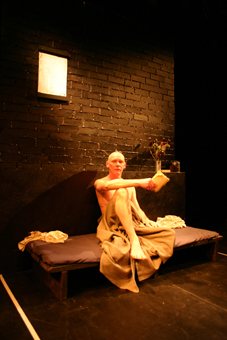 |
Robert Jarman, The Spectre of the Rose photo Carolyn Whamond |
As Genet’s small bright wound was revealed, the whole performance shuddered closer: I understood something. This show is about Genet in his familiar roles—thief, writer, homosexual—but it’s more: an attempt to get underneath the Genet created by the text to the Genet writing, living the text in his cell, where this play’s action occurs.
The key moment arises as Genet indulges himself in a dark sexual fantasy: rough street sex with a sailor he then imagines murdering for the sheer thrill of it. It’s a fantasy drawing on Genet’s adolescent idolising of famous murderers. In Jarman’s previous versions we witnessed Genet somehow triumphant in his cell indulging like a dark god in extremes of sex and death. Here was the same empowered Genet, but with nowhere to direct the raging energy he has built up, but at himself. There is no sailor. He is alone. He is cutting himself.
That’s all he can do. Is this release?
There is further to go and worse to see. Jarman’s Genet has already told us, epigrammatically, that the only way to escape horror is to bury yourself in it, and that’s the way this narrative goes, into a horror starker than Genet had ever imagined. He is alone, naked in his cell, howling to the stone walls: “Kill me! Burn me!”, a cry competing with a terrible throbbing on the piercing soundtrack.
Genet’s brutish epigram is however realised: somewhere in this awe-full moment is the kind of transcendence Artaud sought in his Theatre Of Cruelty. The performer is naked and open, totally exposed, in a moment of symmetry in his engagement with the text. Nudity is a hell of a gambit in theatre, and may miss the mark of genuine transgression by being simply gratuitous, but here I felt it was successful, adding meaning rather than shock. We were looking at a real Genet, failed by his own fantasy: he cannot kill. He is not one with the murderers he idolises. He’s a thief. All he can do is wound himself, the cut revealing far more than blood, the text exposing an angry human, his articulacy warped by imprisonment, a man mired in consuming erotic fantasies, which despite their ultimate failings are still all he has to sustain himself. It’s a deadlock: there is nowhere for him to go, no God to judge him and give him release. He crawls back into the bed where we first saw him. The performance ended, but there was, and still is, a ringing in my ears.
Robert Jarman, Spectre of the Rose, performer Robert Jarman, director Franz Docherty, lighting design Tim Munro, production/stage manager Andrew 'Ghost' MacDonald; Backspace, Hobart, Ten Days on the Island, March 24-27
Andrew Harper is a writer, a performer investigating hybrid and new forms, and an occasional producer and curator. He fluctuates between Hobart and Melbourne.
© Andrew Harper; for permission to reproduce apply to [email protected]








 back
back